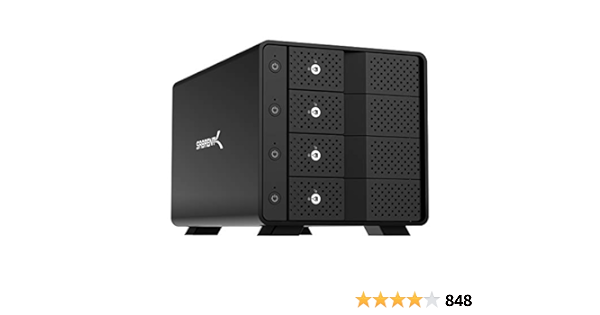When I bought my 27” 2020 iMac 3.8 GHz 8-Core Intel Core i7, 72 GB RAM. I didn’t realize the hard drive was soldered until it was a week too late. The 512 SSD is pretty rough. My computer is filling up.
I also have an 8 TB Seagate Expansion HD external that is pretty full.
Instead of buying a new external to add to the Seagate, or a new bigger HD, I think it’s time that I step up and buy an enclosure for multiple drives. Seems like the mature thing to do. Hopefully, this will save money in the long run and be easier to manage.
If you’re not familiar, my specific iMac model, it has four USB 3.0 ports and dual Thunderbolt 3 (USB-C) ports.
I’ve been looking at a variety of 4-drive enclosures. The pricing is largely based on the speed or type of the connection. USB 3/3.1/3.2 Gen 1/Gen 2 also type C. I’m not too worried about RAID right now.
I’m not sure if I’ll be using HD’s or SSD’s. Due to the price of SSD’s, I’m probably going to start with one or two smaller SSD and two larger HD’s.
I have a few questions…
As far as enclosures, I'm leaning towards this…. Thoughts?

Other recommendations?
Thanks so much!
PS: Also, does anyone know of some good Cyber Monday deals on SSD’s?
TL;DR
I have a 2020 iMac and want a 4-drive external enclosure. Am I wasting money if I get too fast of a connection speed?
I also have an 8 TB Seagate Expansion HD external that is pretty full.
Instead of buying a new external to add to the Seagate, or a new bigger HD, I think it’s time that I step up and buy an enclosure for multiple drives. Seems like the mature thing to do. Hopefully, this will save money in the long run and be easier to manage.
If you’re not familiar, my specific iMac model, it has four USB 3.0 ports and dual Thunderbolt 3 (USB-C) ports.
I’ve been looking at a variety of 4-drive enclosures. The pricing is largely based on the speed or type of the connection. USB 3/3.1/3.2 Gen 1/Gen 2 also type C. I’m not too worried about RAID right now.
I’m not sure if I’ll be using HD’s or SSD’s. Due to the price of SSD’s, I’m probably going to start with one or two smaller SSD and two larger HD’s.
I have a few questions…
- What sort of speed difference would I see between an HD and SSD in real-world use?
- If I want to edit video or mix music on Logic off of the enclosure, will I need an SSD?
- If I get an enclosure with USB 3.2 and end up with all spinning HD's, can they even take advantage of that kind of speed? (Though if I have just on SSD, the 3.2 will be worth it... right?)
- Am I being way too neurotic about this?
As far as enclosures, I'm leaning towards this…. Thoughts?

SABRENT USB 3.2 4 Bay 3.5" SATA Hard Drive Tray Less Docking Station (DS-SC4B)
The Sabrent USB 3.2 4-Bay 3.5" SATA Hard Drive Tray-less Docking Station (DS-SC4B) is the PERFECT solution for all you docking needs! FEATURES • USB 3.2 Type-C port with up to 10Gbps transfer speed. • 4 x SATA 6Gbit/s 3.5” hard-drive bays. • High-quality aluminum for optimal heat dissipation and ...
www.amazon.com
Other recommendations?
Thanks so much!
PS: Also, does anyone know of some good Cyber Monday deals on SSD’s?
TL;DR
I have a 2020 iMac and want a 4-drive external enclosure. Am I wasting money if I get too fast of a connection speed?
As an Amazon Associate, MacRumors earns a commission from qualifying purchases made through links in this post.

